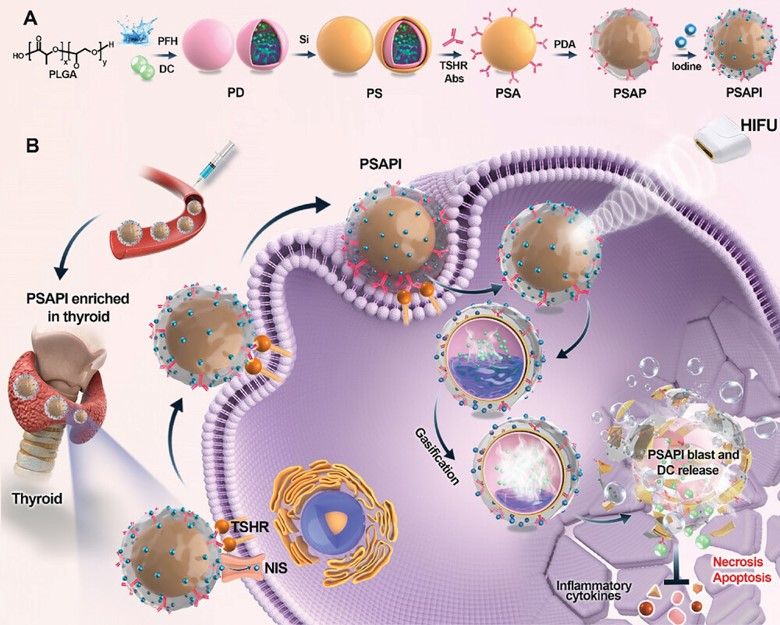In the realm of biopharmaceutical research, lipid-based drug delivery systems are gaining prominence for their efficacy in treating various conditions, including hypothyroidism. Creative Biolabs is dedicated to leveraging our expertise in lipid-based technologies to assist researchers in advancing their hypothyroidism treatment projects.
Thyroid gland, the largest endocrine gland, releases thyroid hormones (TH) in response to thyrotropin-releasing hormone (TRH) and thyroid-stimulating hormone (TSH). It acts on almost all cells, regulating growth, neuron development, reproduction, and energy metabolism to maintain normal physiological activities.
Hypothyroidism is a metabolic disorder characterized by the underproduction of TH, primarily thyroxine (T4) and triiodothyronine (T3). The deficiency can cause various symptoms like fatigue, weight gain, depression, and cognitive problems. More seriously, long-term low TH levels can impact multiple systems, such as cardiovascular, digestive, musculoskeletal, reproductive, nervous, and endocrine.
| Classification of Hypothyroidism | Characteristics |
|---|---|
| Primary Hypothyroidism | Defects in the thyroid gland's synthesis and release of TH |
| Secondary Hypothyroidism | Caused by hypothalamic or pituitary lesions leading to abnormal production or secretion of TRH and TSH. |
| Clinical Hypothyroidism | Elevated TSH levels with low T4 and T3 levels |
| Subclinical Hypothyroidism | Elevated TSH levels with normal T4 and T3 levels |
When treating hypothyroidism, the main aim is to boost TH to a normal level. The most commonly used method at present is hormone replacement therapy, which uses synthetic thyroid hormones to restore normal TH levels. Nevertheless, there are also some limitations in the field of drug delivery:
Low Bioavailability: Oral levothyroxine can be affected by the first-pass effect, which may reduce the drug's bioavailability and impact its effectiveness. By choosing the appropriate delivery system, Creative Biolabs can protect the drug from the influence of the gastrointestinal system, increase the drug's half-life, and achieve better therapeutic effects.
Lack of Targeted Delivery: Current treatments lack the ability to specifically target thyroid cells, potentially leading to systemic side effects. Creative Biolabs can develop functionalized lipid-based drug delivery systems for targeted delivery. Our innovative approach involves conjugating TSH to the surface of liposomes. This method enables targeted delivery to the thyroid gland by binding to the TSH receptors (TSHR) on the plasma membrane of thyroid cells.
Creative Biolabs is fully capable of addressing these challenges through lipid-based drug delivery systems. These lipid delivery systems (liposome, solid lipid nanoparticles) can enhance the solubility and absorption of thyroid hormones such as levothyroxine and iodothyronine while achieving their targeted delivery.
 Fig. 1 Schematic illustration of the synthesis process and therapeutic mechanism of thyroid-targeted nanoparticles. 1
Fig. 1 Schematic illustration of the synthesis process and therapeutic mechanism of thyroid-targeted nanoparticles. 1
Creative Biolabs specializes in the development and manufacturing of high-quality lipid-based drug delivery systems, including liposomes and lipid nanoparticles. Our products are designed to enhance the bioavailability, stability, and targeted delivery of therapeutic agents, including thyroid hormones. Specifically, Creative Biolabs offers:
Creative Biolabs is a trusted partner for researchers and pharmaceutical companies seeking innovative drug delivery solutions.
Creative Biolabs holds a leading position in the field of lipid delivery systems and has extensive experience in liposomes, LNPs, solid lipid nanoparticles, and nanoemulsions. We focus on providing tailor-made solutions for the delivery of thyroid-targeted drugs to ensure precise and effective treatment. Whether you are dealing with small molecules, polypeptides, proteins or nucleic acids, we can design a delivery system that meets your specific needs. Contact us to learn more specific information related to thyroid-targeted delivery.
Reference
 For Research Use Only. Not For Clinical Use
For Research Use Only. Not For Clinical UseApplications
Online Inquiry